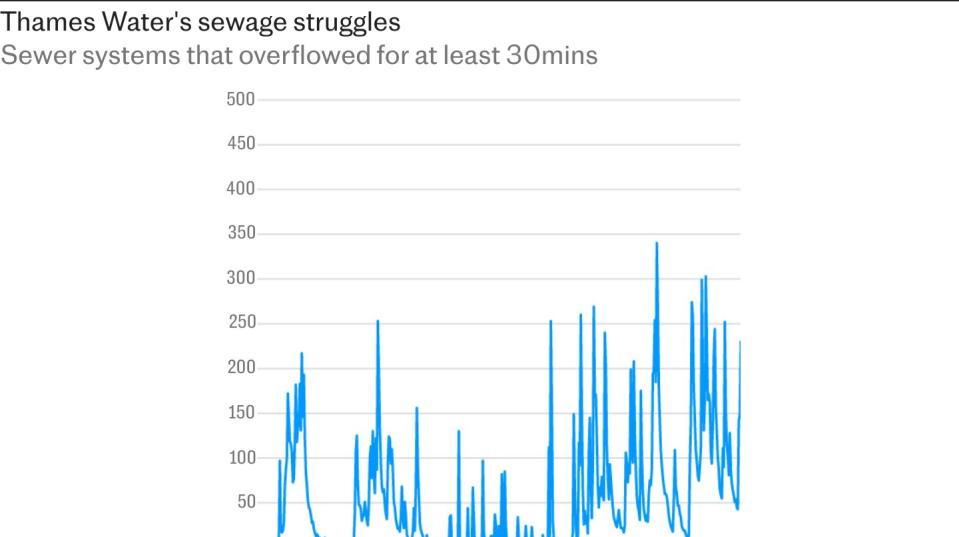The owner of London’s £4.5bn “super sewer” has warned that crisis-hit Thames Water could withhold tens of millions of pounds from the project.
Tideway Tunnel, which is preparing to hand control of the newly-built scheme to Thames next year, said there is a risk that agreed payments will not be made while the troubled utility giant scrambles to conserve cash.
A failure to make agreed payments would risk damaging international appetite to invest in British infrastructure, at a time when Labour is seeking to work with the private sector on improving public services.
In its annual report, Tideway said: “There is a possible risk that Thames Water, given its current financial position, or a special administrator may choose not to pay an element of Tideway’s revenue.
“This would not be consistent with Thames Water’s licence and would be expected to lead to a breach and enforcement action.”
It comes as Thames seeks to avoid collapse within months. The company only has funding to last until May, and investors have refused to put in extra cash unless regulators agree to demands including a 44pc rise in bills.


The prospect of Thames’s failure has already forced Tideway bosses to draw up contingency plans with regulator Ofwat.
The completion of Tideway has been hailed as a rare infrastructure success story in Britain. The 25km (16-mile) tunnel under the River Thames will be the biggest improvement to London’s sewage network in 150 years.
Buried 67m deep, the concrete pipe is designed to ease pollution pressures by redirecting sewage away from the river and into a treatment works in east London.
All major construction work has been completed on the project and it is expected to be fully operational later this year.
Tideway has said the risk of it losing revenue from Thames Water was low. It emerged last week that the utility company is already in breach of its licence after its credit rating was slashed to junk status.
Thames will not own Tideway, which will remain in the hands of Bazalgette, a separate company bankrolled by various institutional investors such as Allianz.
Instead, Thames is expected to pay an annual fee towards Bazalgette for its use of the sewer, which will be funded by a £26 surcharge on household bills.


It has been charged £133.5m by Bazalgette for the current financial year, with a similar fee expected in 2025.
Across the industry, there is growing speculation that Labour will have to bail out the business through a taxpayer-backed special administration regime.
An industry source said: “Any special administrator will be obliged to prioritise payments to Tideway.
“But if there isn’t enough money to do everything, then you are going to spend money on water treatment chemicals to treat the water to make sure it’s safe to drink and you are going to buy electricity to keep pumps running.
“You are going to do this before paying Tideway. However, Tideway will definitely come before any bondholder.”
Tideway has said it has already sought assurances from Ofwat that its revenues will be protected if Thames chooses not to pay up.
A spokesman said: “Tideway is a completely separate, independent company set up to deliver the Thames Tideway Tunnel project.
“Thames Water collects revenue from customers on Tideway’s behalf and passes it to Tideway on receipt. We remain confident that Tideway’s revenues are well protected given water industry legislation and the licence obligations that apply to both Thames Water and Tideway.”
However, the risk to Tideway’s revenues will increase pressure on Thames Water’s bosses, who are under increasing scrutiny amid continued sewage failings.
Sarah Green, the Liberal Democrat MP whose Chesham and Amersham constituency has been affected by pollution over the past year, said Thames Water is “internally failing”.


She said: “On more than one occasion, I’ve tried to reach them and they either haven’t responded or they have sent me an out-of-office that then directs me to somebody else who is out-of-office.
“I think their internal systems are no longer working in the way they need to. And my impression is that there are individuals who are out of their depth. It’s painful to watch.”
Ms Green said she has been forced to go public with her criticism of Thames because of the company’s “vacuum of information”.
She added: “To this day, the chief executive won’t meet with me. You want organisations to trust you and work with you but I’ve reached the point where I feel like I have to shame them on the floor of the House of Commons.”
A Thames Water spokesman said: “We are very much willing to meet with Sarah Green MP. We have engaged with her office and have offered her a meeting with our operations director on two separate occasions earlier this year to discuss the specific issues relating to her constituency.
“Due to the general election and the rules governing the pre- election period we paused communication and are now picking up any outstanding enquiries we have received from Ms Green and her office.”
Source Agencies


